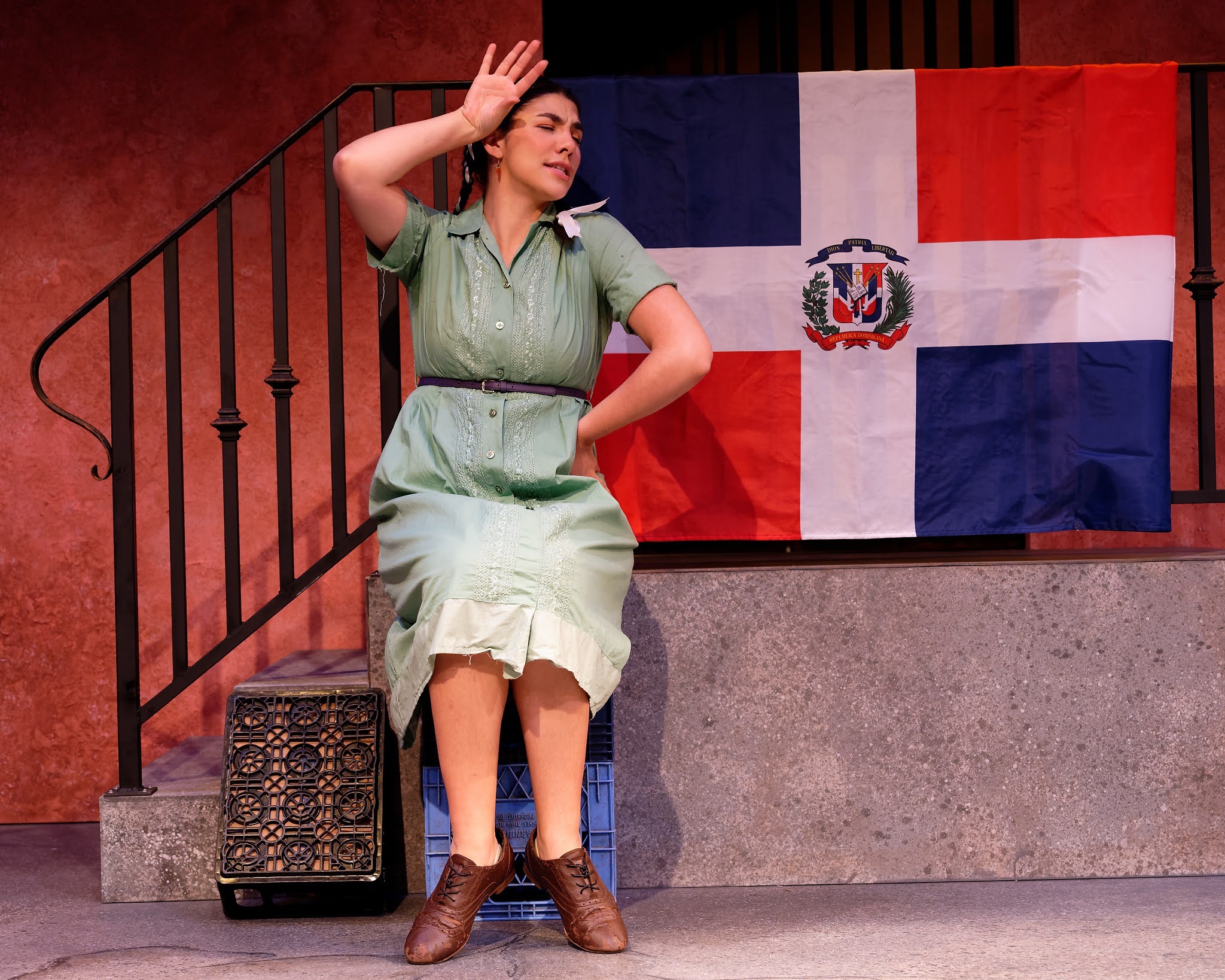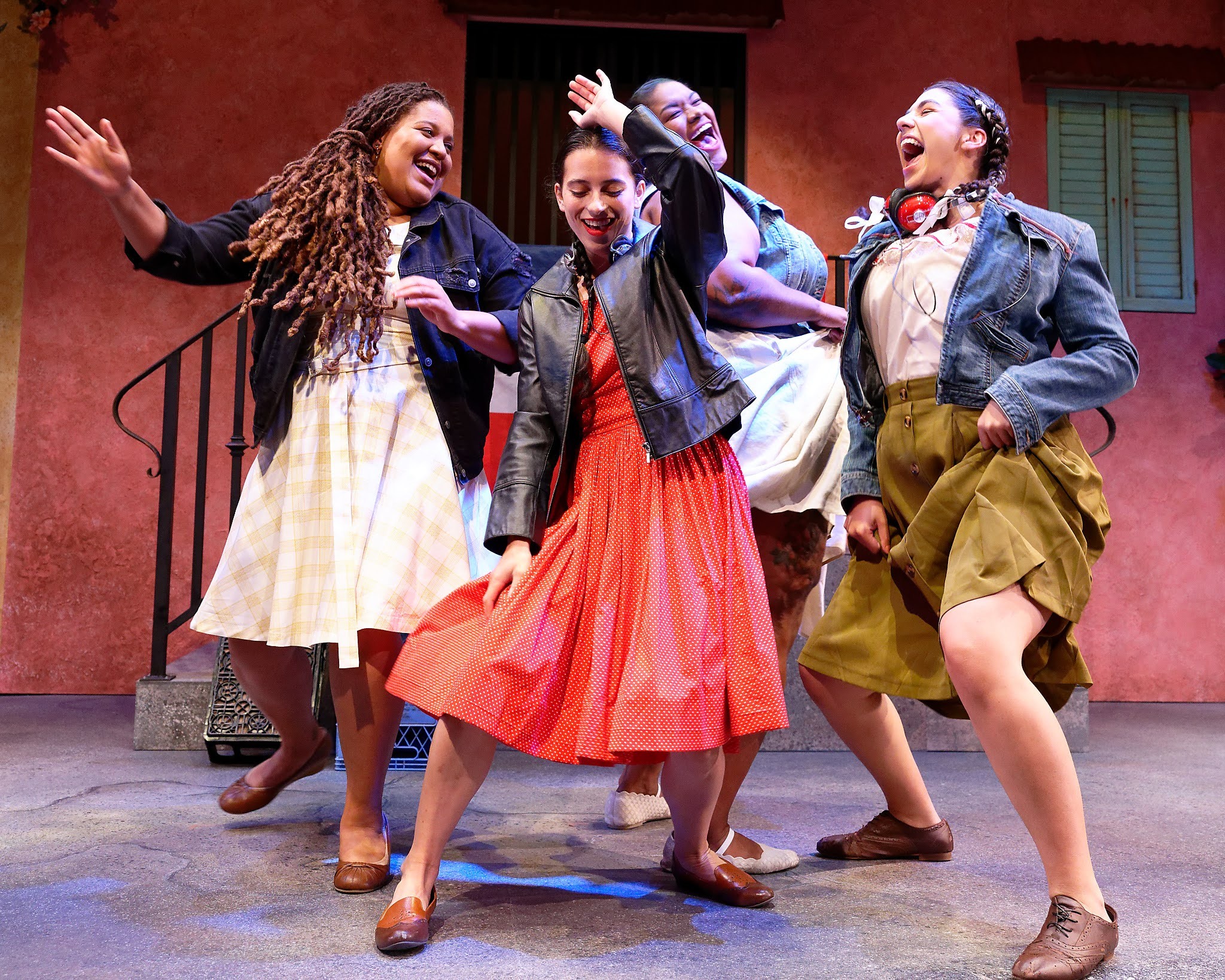Las Mariposas: How a Rebellion Spread its Wings
Review of In the Time of the Butterflies presented at Book-It Repertory Theatre
Written by Teen Writer Joelle Walworth and edited by Teen Editor Audrey Gray

The play opens to a lively set, filled with bright colors. Music pulses through the floorboards. The separation between the audience and the actors shrinks, and we are brought into the powerful, resonant story of four brave sisters. Directed by Ana María Campoy, the play In the Time of the Butterflies showcases the story of Las Mariposas and their rebellion against the Dominican Republic’s dictator Rafael Trujillo. Las Mariposas were four Dominican sisters—Dede (Beth Pollack), Minerva (Jasmine Lomax), Patria (Aviona Rodriguez Brown), and María Teresa Mirabal (Sofía Raquel Sánchez)—living during the tyrannical reign of President Trujillo. They helped lead the rebellion against his dictatorship, and three of them were eventually killed for it—their legacy, however, still played a role in Trujillo’s downfall. Based on the novel by Julia Alvarez and adapted for stage by Caridad Svich, the production by Book-It Repertory Theatre effectively conveys the events of Las Mariposa’s rebellion, but falters in operating as a theatrical piece.
One blatant issue with the piece is that as the sisters mature, the play’s events seem to have minimal effects on them. The sisters experience imprisonment, harassment, and horrors beyond imagination, but quickly after these events transpire, the characters return to their original disposition as though they had not encountered these evils at all. This flagrant lack of character growth is most noticeable in María Teresa. As a child, she was spunky and cheerful, always wanting new dresses and shoes. Her immature attitude surrounding clothing continues throughout the story, right up until her death—while Las Mariposas are driving before they are stopped and killed, María Teresa remarks on wanting a new bag. In some ways, this can be interpreted as a demonstration of how the sisters’ core values still hold true throughout all circumstances. However, in this scene, María’s materialism came off as shallow and fit the atmosphere poorly. Her childishness contrasts sharply with the mature and solemn María Teresa we see when she is actively participating in the rebellion. This inconsistency rendered attempts at understanding her emotional growth from child to adult near impossible. Her inconsistent nature could have been used thoughtfully to show the effects of Trujillo’s tyranny, but instead it makes it difficult to understand her character because she acts like two entirely separate people.

Similarly to the characters’ unnatural growth, the script was often jarring and lacked thoughtfulness. At times in the play, characters would begin to narrate their actions, and it was unsettling to go from the expected theatrical dialogue to stilted, literary-style phrases. This highlighted that this was a scripted theatrical production, breaking the audience’s immersion. While there were some typical theatrical devices, the play was painfully and obviously adapted from a novel. Instead of the creation of a stand-alone play, In the Time of Butterflies created a piece reliant on the audience’s assumption and acceptance that it was an adaptation and therefore would include elements of a novel—elements perfectly suited for writing, but much less so for acting.
While the odd writing choices isolated the audience from the story, the vivid and exciting music drew in the audience, using powerful and fast beats to demonstrate the closeness of the sisters’ relationship. The upbeat music, combined with friendly interactions, showed the sisters’ fun together, and puts later tragedy into perspective for a greater impact on the audience. During the dramatic scenes, the music slowed and allowed for a haunting feeling to fall over the audience, and before large conflicts, the music slowed to a crawl and the lights shone frighteningly on the actors. The musical composer, Eduardo Mendonça, truly created something magical for In the Time of the Butterflies—the music greatly added to the compelling storyline and made me feel for the characters when the script could not enliven the scene.

Other than the music, the play’s use of a butterfly motif to convey a theme of freedom was the most compelling aspect of the production. As an older Dede recalls her sisters’ lives, they are likened to butterflies who are finally free after Trujillo’s reign has ended. While the characters regularly mitigate their speech to avoid retaliation from Trujillo or his allies throughout the timeline of the play, in our present time an unrestrained version of their story can be told—with storytelling, Dede and In the Time of the Butterflies keeps the memory of Las Mariposas alive and metaphorically flying like the butterflies.
However, most other themes were not as well fleshed out as the butterfly motif. There isn’t a clear, overarching theme in this production. The two hour-long piece attempts to cover the importance of keeping memories alive, the struggle between protecting those you love and fighting for them, and the love of one’s country. What’s more, in attempts to help the audience better understand characters, there were often drawn-out soliloquies—in some regards, this aided in developing each character’s individual desires and beliefs, but it also tended to introduce internal conflicts that were never resolved. As a result of the play’s attempts to discuss too much, characters and topics were underdeveloped, and the variety of ideas covered lacked nuance.
In the Time of Butterflies is a reminder of the importance of immersion and giving time to important ideas. Odd dialogue choices detached me from the story, and themes and characters lacked development. While the transposition of a novel to a play was likely difficult, blatant issues that stemmed from it begged the question: if a story would be better told through literature than theater, should it stay as a book? Still, aspects of great theater were present. The stellar music and the beautiful symbolism fought the less exemplary elements of the play to draw the audience in. Even with the caveat that the story was better told as a novel, the incredibly powerful story of Las Mariposas was able to shine through the production, a true testament to the power of these sisters’ story in all forms.
In the Time of the Butterflies took place at Book-It Repertory Theatre on September 21 — October 16, 2022. For more information see here.
Lead Photo: Photo by Anthony Floyd
The TeenTix Newsroom is a group of teen writers led by the Teen Editorial Staff. For each review, Newsroom writers work individually with a teen editor to polish their writing for publication. The Teen Editorial Staff is made up of 6 teens who curate the review portion of the TeenTix blog. More information about the Teen Editorial Staff can be found HERE.
The TeenTix Press Corps promotes critical thinking, communication, and information literacy through criticism and journalism practice for teens. For more information about the Press Corps program see HERE.

